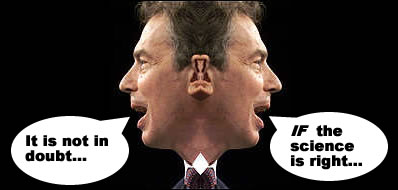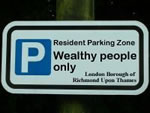 "It is not in doubt that if the science is right, the consequences for our planet are literally disastrous."
"It is not in doubt that if the science is right, the consequences for our planet are literally disastrous."
Tony Blair, speech at the publication of the Stern Review on climate change,
30 October 2006
'If' the science is right, Tony? IF? So there's still, erm, doubt?Blair claims that the scientific evidence for global warming 'caused' by greenhouse gas emissions is 'overwhelming'. But clearly not overwhelming enough to prevent him hedging his bets and putting that 'if' in his speech. With doubt over the scientific evidence for the human effect on global warming still evident at the top of government, it would obviously be totally unacceptable for the government to now try slapping extra, highly repressive taxes on people using the excuse of that evidence. Such a move could now only be seen as driven by one agenda - using global warming as an excuse to simply increase the government's tax income.You could say - IF the Stern Review was supposed to provide the justification for hitting people with higher taxes in the name of combating global warming, Blair's comments have put paid to that.
 First, propaganda -
First, propaganda -
next, pay day?Nothing illustrates better where the environment hysteria agenda has been heading than the framing of today's question on BBC Radio 1's lunchtime news programme Newsbeat. Listeners were being encouraged to text and e-mail what they thought on the question, Would you pay more taxes to save the environment?
There's nothing the government and largely hard-left environment hysteria lobby would like more than for people to start to believe that all they need to do is shell out still more of their hard-earned cash to politicians and everything will be alright with the planet. Apparently, it's simple: tax equals saving the planet, no tax means global catastrophe. Such is the dichotomy that, with pound-signs in their eyes, it could be suspected that the hysteria lobby have long been working to establish.Rather than focussing on and encouraging changes of behaviour people can make at little cost, the 'green' agenda has always been peppered with the idea that we need to be properly punished for our polluting, modern ways - that our lifestyles are 'unsustainable', and we'd better get used to going without the things we need, and without doing the things we enjoy. There's always been this certain masochism to the green lobby - a gleeful seizing on a supposed reason to return to simpler times of previous centuries - coupled with a bizarre, burning need to inflict it on everyone else.
And now, after the years of 'looming disaster' propaganda, we're reaching the crunch point. Fingers firmly crossed, hoping the years of propaganda have worked their magic, the politicians are finally gearing up to claim another big chunk of the little hard-earned cash we have left for ourselves after the other chunks they take. Thankfully, looking at responses to that question on the Radio 1 link above, most people are a long way from succumbing to this ploy.Pounds, not planet
So how do we know the global warming hysteria is really about revenue-raising rather than saving the planet? Take the rather critical fact that energy use in homes and businesses is by a long way the biggest cause of carbon emissions, and that far greater efforts to encourage energy conservation would therefore make a much bigger dent in Britain's total emissions. Surely those really interested in affecting the environment for the better would be obsessing about energy conservation? You'd have thought.
But no. The first choice for national and local politicians is always to set about finding ways to ramp up taxes on individuals which, even by deliberate design (see Richmond's 'green' parking permit con & Lib Dem car tax trap postings), have the greatest impact not on the wealthy but hard-pressed families trying to keep up with the many existing financial demands of modern life.
Punish or encourage?Why is it that punishment, rather than encouragement, is always the first choice for politicians? For example, rather than planning to charge us still more for the necessity of a car, for imagining we might take a holiday or for daring to throw out some rubbish, the government could abolish VAT on energy-saving light bulbs, on solar panels, on wind turbines, on roof insulation, on getting gas boilers maintained regularly, on double-glazing. These improvements would become more affordable and all would have a significant impact in the area of the biggest cause of carbon emissions.If the politicians really must 'do' something in the area of road transport, they could scrap the duty on biodiesel. Or, more practical still, the government could cut its massive tax take on the price of new, more efficient fuels like the one that BP has recently developed - BP Ultimate. BP claim that if every car used that instead of ordinary unleaded, the effect on emissions would be the same as taking 1 million cars off the road. That's equivalent to taking all cars out of a city the size of Newcastle! So why don't many drivers use this fuel? Because BP Ultimate costs a lot more than normal unleaded. It wouldn't, though, if the government gave up a small part of their 70% fuel tax grab to bring the price down to on a par with the regular fuel. If they did that, of course car users would choose the more efficient, environmentally-friendly option and the benefit to the planet would be both instant and massive. Certainly there is something very wrong with politicians planning to slap more taxes on people yet taxing better fuels like this to the hilt so few can afford to help the environment even if they wanted to.Money where the mouth isIf that's not enough, here's another idea. If global warming is really a bigger threat than terrorism, as the green lobby regularly claim, then why doesn't the government spend the billions of pounds ear-marked for their highly controversial ID cards plan on developing alternative energy sources, like harnessing tide power, building off-shore wind farms, or installing solar panels on public buildings? Politicians simply can't expect us to treat saving the planet as a priority and pay through the nose for it if they don't exhibit the same attitude themselves.
So is it any surprise that some suggest politicians aren't so interested in changing things to help the planet as grabbing yet more money off us? Environment needs new approachThe door is wide open for a political party to spearhead a positive, pragmatic, reasonable and creative environmentalism, utilising market forces and encouraging people with benefits for pro-environment choices. Rather than attempting to bludgeon us with the lazy, blunt instrument of higher taxes.So... Gordie, Dave, Ming? Who's it going to be? Whoever, you'd better make it quick.
 Richmond's 'green' parking permit con
Richmond's 'green' parking permit con
Richmond upon Thames in south west London has seen the latest outbreak in efforts to ramp up taxes on the already over-burdened car user citing global warming.
Despite the fact that energy use in homes and businesses is by far the biggest reason for Britain's carbon emissions - and encouraging energy conservation therefore likely to make a far more productive contribution to reducing total emissions - Richmond council has joined the ranks of unimaginative politicians and unjustifiably decided to pick on the car user yet again.
That this idea comes from Richmond council is no surprise when we discover it is controlled by the Liberal Democrats. This is the party that signalled its intention to excessively victimise car users in an absurd car tax policy proposed at their recent conference.
Charges hit more than 'wealthy'There are so many disturbing features about this latest proposal that it's hard to know where to begin.
First let's deal with the idea that this is a plan to 'make the wealthy pay more' for choosing big, polluting cars. In fact, its implications go far wider. Even best-selling small city cars like the Mini, Ford Fiesta and Nissan Micra are in the Band D set to be hit with a 10% increase in permit charges. That's an increase four times the rate of inflation.
Looking at the next band up, with permits due to cost 30% more under the new regime, even very average family cars like the 1.8 litre Ford Mondeo and Vauxhall Vectra appear.
So what exactly do Richmond council expect people to use in order to avoid these excessively increased charges? Or could the intention possibly be just to get their hands on more of people's hard-earned cash and global warming is just a handy excuse? Because this plan, as it stands, will quite obviously hit not just the wealthy or owners of large cars, but the far larger number trying to get by on average incomes using a wide range of very normal, average cars.
Complicating factorsThere are also several complicating factors. For example, the purchase price of all new Land Rovers - the dreaded 'polluting 4x4s' we hear so many complaints about - will from next year include the cost of off-setting three years worth of their carbon emissions. So, actually, a brand new Land Rover is carbon neutral for its first 45,000 miles and so far better for the environment in that period than any other car. But is Richmond going to inspect the mileages of new Land Rovers and exempt all those showing under 45,000 from their new resident permit charges? They would, if they were really interested in promoting pro-environment action.
What's more, there is some debate about the real fuel economy under everyday conditions of the Toyota Prius, the only car in the council's proposed 50% reduction Band B which isn't too small to be suitable for average family use.
Even if this plan were to be focussed only on larger cars, let's be clear. Owners of 'gas guzzling' cars already pay much more for their choice, by definition. The more fuel a car uses, the more fuel tax is paid. And let's not forget, the government's share of the price of a litre of fuel is more than 70%. Car tax is also now graduated by emissions, meaning they also pay more for that too - far more than is ever spent on maintaining roads.These are already massive 'green' taxes car users are paying, and have long been paying - the owners of 'gas guzzling' cars more than any. Yet is this massive existing government income already being used to help 'save' the environment? Hardly.
Council hypocrisyBut beyond the transparant real agenda of this plan, it's the blatant hypocrisy of Richmond council that's most galling. They're proposing to hammer thousands of middle income local car users over the cost of parking a car outside their own house (on which they presumably already pay a large slice of Council Tax) spouting solemn lectures about the threat of global warming while, according to the Times report on the proposal, not only maintaining car parking facilities for their own staff but even offering them subsidies.
If the threat of global warming were truly as urgent and action as necessary as they claim, then getting their own house in order is surely a pre-requisite of preaching to others - certainly of being taken seriously and avoiding a backlash come the next election.
It's very hard to avoid the conclusion that this plan is motivated not so much by concern for the environment as, yet again, by a desire to raise revenue from the already over-paying car user, hoping they won't complain if the plan is dressed up in a green banner.
Richmond Council is currently consulting on their plans and wants feedback. You can comment here.


